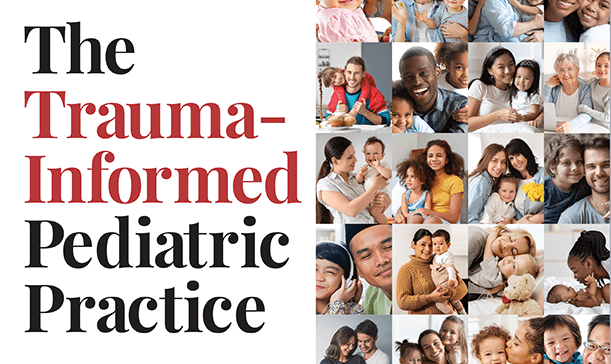By Nurture Connection
R.J. Gillespie, MD, MHPE, FAAP, and Amy King, PhD, are the authors of The Trauma-Informed Pediatric Practice: A Resilience-Based Roadmap to Foster Early Relational Health, published by the American Academy of Pediatrics (AAP).
Nurture Connection talked with the authors about the book and how it can transform pediatric practice for clinicians and families.
- Why did you decide to write this book and make the intentional link between trauma-informed practice and a resilience-based road map to foster Early Relational Health (ERH)?
R.J. Gillespie: I first learned about trauma-informed care (TIC) after reading the AAP policy statement from 2012, and then the original adverse childhood experiences (ACE) study. At the time, TIC felt very conceptual and theoretical: Understand that trauma is everywhere; patients may be presenting with symptoms of trauma; listen compassionately; be empathetic and kind. While all of these are important concepts, there was little practical guidance.
As a pediatrician I’m dedicated to prevention in my clinical work — so I became interested in the idea of how to prevent trauma in my patients, and part of that is understanding the baggage that some parents and caregivers carry into their own parenting experiences. Many who had experienced trauma in their own childhood had essentially missed out on having a safe, stable, nurturing relationship, and they lacked good models for raising their children.
Early childhood trauma represents a rupture in the relationship between a caregiver and their child. Building relational health between caregivers and their children — or building resilience in families — is a preventive practice for lessening the effects of trauma for children.
Amy King: And the earlier we intervene for kids and families, the more efficacious we can be.
- How does relational health show up in a trauma-informed practice?
R.J. Gillespie: Anything that promotes supportive relationships is trauma-informed care, because we are mitigating the effects of trauma by ensuring that the nurturing relationship is present for the child.
Amy King: In the pediatric setting, we’re looking for connections that display good relational health between caregiver and child. Is the caregiver nurturing? Are they showing concern? In other words, are we noticing attunement between the caregiver and child? Are we observing the child developing social and emotional health skills? If so, then we clinicians can reinforce those behaviors and say, “Oh, my gosh, look at what you’re doing! You’re creating these positive experiences that really build your child’s relational health skills for navigating through life.” And when we notice that attunement is less developed or the relationship is struggling, we can offer guidance and interventions that help the relationship get back on track.
- Can you each tell us a story of an experience that changed your mindset from concentrating on ACE awareness to the promotion of ERH?
R.J. Gillespie: I always think back to a mother of a four-month-old. We were talking about her ACEs. Her father experienced alcoholism, and the domestic violence in the house was so severe that she thought her mother was going to die in front of her on multiple occasions. Her sister married the same kind of guy … so the pattern of trauma was repeating within her generation. She was tired and tearful when she said to me, “I just want better for my kids than what I had.”
In retrospect, her intention to create a better life for her child was and is an incredible strength. She was asking me for guidance and support, so I interpreted her question as “How do I create an environment where my kid is supported, loved, and safe?” That all comes down to promoting relational health for the family.
Luckily, about that time I met Amy and started learning how to enhance my well-child exams to include interventions for promoting relational health.
Amy King: When I was a behavioral health consultant, I worked with caregivers on developing their relational health skills. I talked to them about the importance of connection and focusing not on their child’s bad behavior, but what’s behind it and how to support their emotions. When you see caregivers begin to shift how they’re interacting with their kids, you see them breaking the cycle of intergenerational trauma, creating more securely attached, resilient people, and we know that creates long-term positive health outcomes.
- What are resilience-based interventions? Can you share an example of what this looks like in pediatric practice and how these interventions help families thrive?
R.J. Gillespie: Interventions are brief, directed activities that can be discussed in a relatively short period of time, so we still can address everything we need to cover in a well-child visit.
These interventions help caregivers decode their infant’s or toddler’s behavior, and give them practical tips on how to promote their child’s development. For example, I tell the parents of all my two-month-old children about mirror neurons and how spending face-to-face time with their child will actually stimulate their child’s brain. So the simple act of making faces at their child to see what makes them smile, laugh, or be quiet and pay attention will help to build their brains. Amy calls this “being a baby observer,” and it is a great intervention for very young infants.
Amy King: Resilience interventions are intentional ways we, as clinicians, provide guidance to caregivers to interfere with potentially negative health outcomes, or enhance positive relational health. One intervention is “special time” where we’ll ask parents to spend five to 10 minutes, three or four times a week in uninterrupted time with their child, simply following their lead. And we just see a big shift from “Oh, my kid is just being naughty and attention-seeking” to “They were just needing connection with me.” And often we’ll see the negative behavior decrease because the child knows their caregiver will be available for connection at other times. It enhances the relational health of the caregiver and the child, and helps the child begin to regulate feelings as well.
- What are the most important things that pediatricians and clinicians can do during their encounters with families that help promote relational health, especially ERH?
R.J. Gillespie: I think it’s important to remember that building relational health isn’t done in a single visit. I like the Harvard Center on the Developing Child’s model of three core activities for improving outcomes: reducing sources of stress, promoting supportive relationships, and building core life skills.
This means taking time to understand barriers to relational health for families, including social drivers of health, caregiver trauma histories, and caregiver mental health problems. Screening for peripartum mood disorders and social determinants of health is a core part of our work.
It also means revising our anticipatory guidance to include a relational health lens. For example, when we talk about nutrition, rather than just telling people to eat their broccoli, I like to talk about conversations they can have at dinner to create rituals and routines around mealtime, like discussing highs and lows that happened during the day. Instead of simply counseling about how many hours of sleep a child needs, ask about whether they are reading, singing, or telling stories to their child as part of a bedtime routine.
Amy King: It’s also just asking parents, “How can I help and partner with you? If you had trauma in your childhood, what are you doing now that has helped you overcome that? What gets in the way of being the type of parent you’d like to be?”
Talking about the importance of connection is critically important. Parents can do a great deal to offer positive interactions that bolster relational health, and therefore, resilience. So planting those seeds early and often, noticing when caregiver attachments are disrupted, parents seem really off, or kids are struggling, is a key to remaining curious. I’m looking for all of those little cues and staying intentional about the relationship. Then, I can offer partnership and education and guidance and collaboration.
- What do you hope will be the impact of your book for pediatric practice?
Amy King: We’re hoping that the book serves as a road map for providers to feel a little bit less daunted by talking about trauma and focusing more on those buffering mechanisms, positive experiences, and enhancing relationships. If we do that, providers feel more competent, confident, and less burned out. And when we offer guidance to caregivers about relational health, we truly begin to embrace a positive, preventative, upstream approach to caregiver guidance and healing trauma that children experience.
R.J. Gillespie: Honestly, I’m hoping for a total transformation of pediatric healthcare. Well-child care is often viewed as a checklist of tasks rather than an opportunity to promote true wellness, not just for the children in our offices but also for the caregivers and the rest of the families. For me, working on ERH in practice has been a transformative and a truly anti-burnout experience. I feel like I’m doing meaningful work, and I want all my colleagues to experience the same thing.

R.J. Gillespie, MD, MHPE, FAAP, is a pediatrician in private practice in Portland, Oregon. He consults on practice-based quality improvement, particularly in the areas of screening and assessments that support Early Relational Health, and has participated in multiple national and statewide screening initiatives through the American Academy of Pediatrics, the Oregon Pediatric Society, and the Children’s Health Alliance, among others.

Amy King, PhD, is a licensed psychologist who provides training, consultation, and education to professionals and organizations. She specializes in trauma-informed work and resilience building. Dr. King has served as a statewide trainer for the Oregon Department of Human Services, Child Welfare, and as a subject matter expert to promote child wellness in pediatric settings on behalf of the Children’s Health Alliance.
